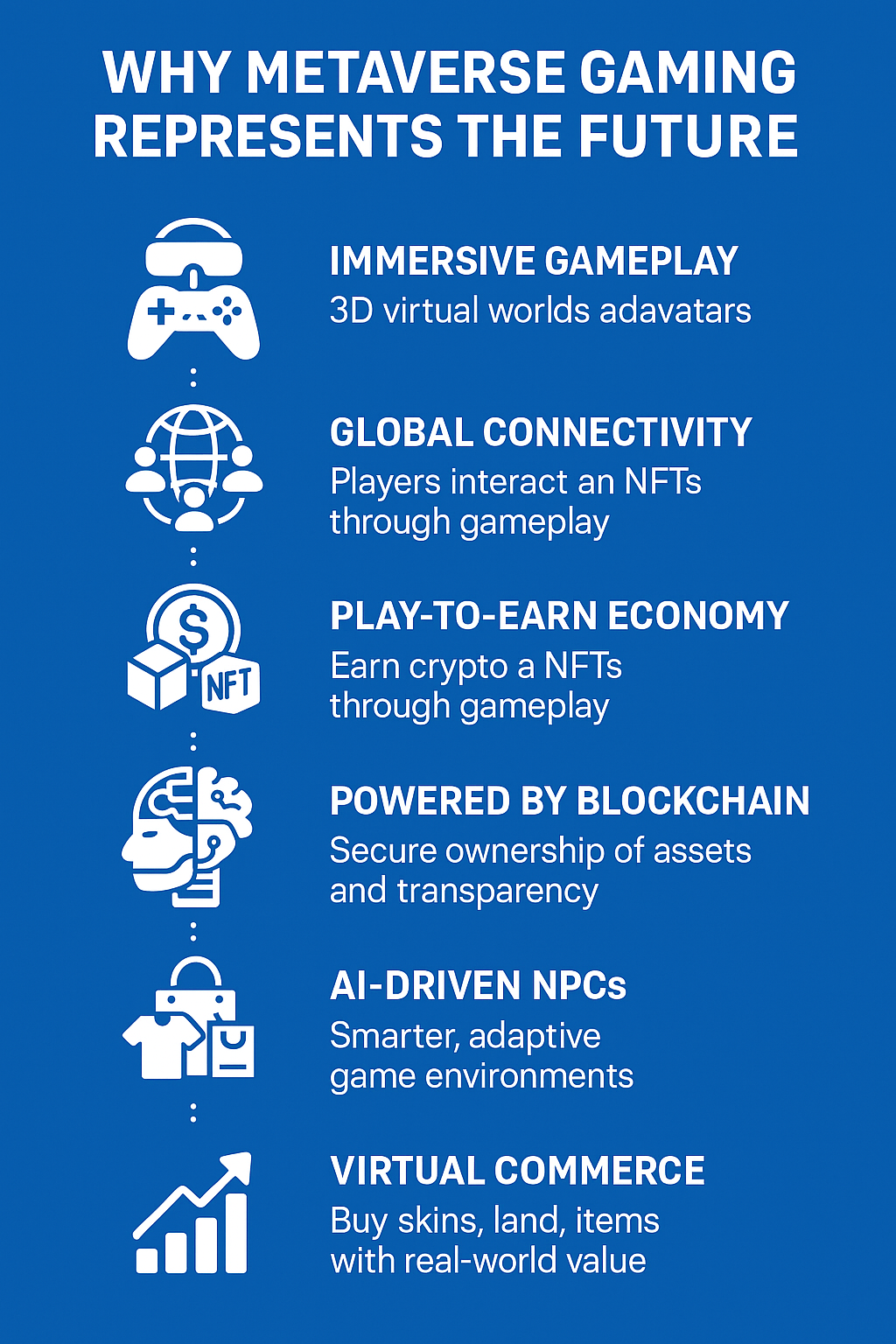The gaming industry has never been static. From arcade machines to cloud gaming, every decade brings a new evolution. Today, we stand at the threshold of yet another game-changing transformation: Metaverse game development. As immersive technologies, blockchain infrastructure, and player expectations converge, the future of gaming is moving beyond screens into persistent virtual worlds.
The Metaverse gaming industry is not a buzzword anymore, it's a rapidly growing ecosystem of interactive, decentralized, and value-driven experiences. Let’s explore why it's set to redefine how games are built, played, and monetized.
Understanding Metaverse Game Development
Meta game refers to the process of creating interactive 3D virtual worlds where players can explore, socialize, earn, and own digital assets. Unlike traditional games, these environments are persistent (they exist even when players are offline), decentralized (often powered by blockchain), and interoperable (allowing assets and avatars to move between platforms).
Core elements include:
- Immersive gameplay using VR/AR
- Decentralized economies built on blockchain
- True digital ownership via NFTs
- Play-to-earn models that reward players
- Social hubs and real-time collaboration
Together, these elements form a dynamic foundation for the next generation of gaming.
Why Metaverse Gaming Represents the Future

1. Immersive Experiences That Go Beyond Gameplay
Metaverse games are designed to feel real. Through virtual reality games and spatial computing, players are not just interacting with a screen—they’re inside the game. Whether it’s walking through a fantasy world, attending virtual concerts, or building virtual real estate, the line between the digital and physical experience begins to blur.
This level of immersive game development is unmatched by traditional gaming, offering emotional and sensory depth that significantly enhances user engagement.
2. The Rise of Play-to-Earn Economies
Play-to-earn Metaverse games shift the value proposition in gaming. Instead of spending money on in-game items with no real-world worth, players can now earn cryptocurrency or NFTs that can be traded, sold, or used across other platforms.
Games like Axie Infinity, Decentraland, and The Sandbox have shown how this model attracts millions of players worldwide, especially in emerging markets where gaming can now become a legitimate income source.
3. True Ownership with NFT-Based Games
In traditional games, assets like skins or characters are locked within a central system. NFT-based games solve this by assigning in-game items as blockchain tokens. This gives players true ownership of digital assets, enabling them to trade or use them across different Metaverse game platforms.
For developers, this means more engagement and less churn. For players, it creates an entirely new level of investment and customization.
4. Seamless Social Interaction and Community Building
Gaming is no longer a solo activity. The Metaverse offers players virtual spaces to collaborate, socialize, and build communities. These aren't just multiplayer modes—they’re entire societies with economies, social events, and governance systems.
Platforms like Roblox and Fortnite are already evolving into 3D virtual games that double as digital gathering places. In the Metaverse, interaction is not an add-on; it’s central to the experience.
Emerging Trends in the Metaverse Gaming Industry
The Metaverse gaming industry is evolving rapidly. Here are some of the most significant Metaverse game trends shaping the next phase:
✅ Cross-Platform and Interoperable Assets
Future games will allow players to carry avatars, items, and tokens between games and platforms, fostering a unified virtual experience.
✅ AI-Driven Game Environments
Advanced AI will enhance NPC behavior, dynamic storytelling, and environmental changes, making gaming in the Metaverse more adaptive and lifelike.
✅ User-Generated Content and Creators’ Economy
Games will become platforms where users build and monetize their own experiences, blurring the line between developers and players.
✅ Scalable Blockchain Infrastructure
New protocols like Immutable X and Layer-2 solutions will make blockchain games faster, cheaper, and more scalable.
✅ Mobile and Lightweight VR Integration
With advancements in hardware, lightweight VR devices and mobile accessibility will bring Metaverse gaming to a broader audience.
Real-World Examples: Where It’s Already Working
🎮 The Sandbox
A prime example of a Metaverse game platform that empowers users to build games, own land, and monetize creations using $SAND tokens and NFTs.
🎮 Decentraland
A decentralized 3D world where users host virtual events, exhibitions, and games all powered by blockchain and community governance.
🎮 Illuvium
A high-fidelity, NFT-based RPG that combines traditional game mechanics with crypto-based asset ownership, showing how AAA experiences are entering the Metaverse space.
These examples show that the technology is not just theoretical—it’s functional, engaging, and profitable.
Challenges to Consider
While the potential is massive, Metaverse game development also faces some critical challenges:
- High hardware requirements (VR headsets, powerful GPUs)
- User onboarding and education (crypto wallets, NFTs)
- Regulatory uncertainties (asset ownership laws)
- Security and data privacy concerns
However, developers and platforms are actively addressing these through better UX design, scalable tech stacks, and community-focused solutions.
Why LBM Solution Is Your Ideal Metaverse Game Development Partner
At LBM Solution, we understand that building in the Metaverse is not just about code—it’s about creating experiences, economies, and communities. Our Metaverse game development services are focused on:
- Full-stack development with blockchain and NFT integration
- High-performance 3D environments optimized for VR/AR
- Token economy design and smart contract implementation
- UI/UX design for immersive gameplay
- Ongoing technical support and scalability solutions
Whether you’re launching a decentralized game or a full-scale Metaverse ecosystem, we help you bring your vision to life—securely, creatively, and strategically.
Conclusion: The Metaverse Isn’t Coming—It’s Already Here
The Metaverse is not a futuristic concept; it’s a living, growing space where virtual reality games, decentralized assets, and real communities converge. With the surge of innovation in Metaverse game platforms, blockchain integration, and immersive environments, the future of gaming lies beyond conventional boundaries.
Metaverse game development offers more than entertainment—it offers connection, ownership, creativity, and economic value.




